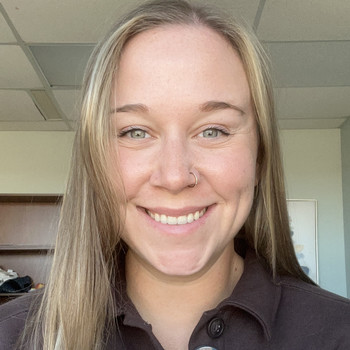SGS Celebrates Graduate Student Winners of Federal Tri-Council Awards - Megan Muise
Author: Andrea
Posted on Dec 18, 2024
Category: News and Events , Student Stories

Profile of: Megan Muise
Award Received: SSHRC Canada Graduate Scholarship - Doctoral
Awarded for the project: Opening the dialogue: Comfort and barriers when discussing sex with queer clients in therapy
Department: Psychology
Supervisor: Dr. Scott Ronis
I came to my research topic through a problem that stumped me as a new clinician: despite being involved in sex research for years and considering myself pretty comfortable with the topic, I found myself hesitating to bring up sex with clients. It made me wonder, why is this so hard to talk about? And how might being part of a marginalized group, such as the 2SLGBTQ+ community, make these conversations even tougher and less likely? Queer people face higher rates of mental health struggles, and at the same time, therapists often aren’t prepared to trained to talk about sex in a way that is open and affirming. My dissertation research dives into these issues to figure out how often conversations about sex are happening in therapy, what makes them hard, and what we can do to make therapy better for queer clients.
To explore these dynamics, I am conducting in-depth interviews with 15 self-identified queer individuals. These interviews delve into topics such as general comfort discussing sexuality and sex, previous therapy experiences, and how gender identity or sexual orientation influences interactions in therapy. Sample questions include:
- How comfortable do you generally feel when talking about your sexuality or sex life, whether in personal or formal settings?
- What factors might make you more likely to discuss your sex life in therapy?
- Can you describe any specific barriers that might make it difficult to talk about your sexuality or sex life in therapy?
- Do you think a therapist’s identity (e.g., gender or sexual orientation) would affect your comfort level in discussing sex?
The study will also include surveys of therapist to assess their comfort level, training, and frequency of addressing sexual issues with queer clients. By examining both populations, I hope to uncover similarities and differences in their perspectives.
When reviewing the current available research, I noticed there isn’t much out there about queer people in sex therapy. Most of what exists is from the therapist’s perspective, and I think it’s time we highlight the voices of queer clients themselves. My goal with this research is to better understand queer people’s experiences in order to help therapists learn how to create spaces that feel affirming, sex-positive, and genuinely supportive. At the end of the day, I hope this work can help therapists feel more comfortable and capable, and help them provide better services to queer folks.
